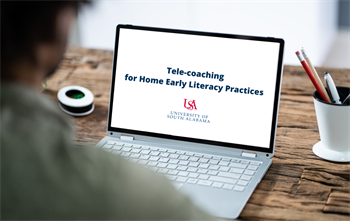Literacy Spotlight: Tele-coaching for Home Early Literacy Practices
 Throughout September, Phi Kappa Phi has celebrated National Literacy Month by taking a closer look at projects supported by our Literacy Grants. This third installment focuses on a tele-coaching program based out of the Autism, Pediatric Language and Literacy Lab at the University of South Alabama.
Throughout September, Phi Kappa Phi has celebrated National Literacy Month by taking a closer look at projects supported by our Literacy Grants. This third installment focuses on a tele-coaching program based out of the Autism, Pediatric Language and Literacy Lab at the University of South Alabama.
According to the National Assessment of Educational Progress, in 2019, only 28% of Alabama fourth graders were reading at or above proficiency. Project partners Brenda Beverly and Victoria Henbest are leading the plan to create a parent-training program conducted via tele-coaching to facilitate activities in the home that foster literacy for preschoolers.
Though the planning began before the pandemic, the remote aspect of the project worked well with the hopes to keep families safe in their homes while participating. Families will be chosen from the Gulf Coast region with extra effort to reach out to parents of children from lower income households.
Beverly and Henbest recently shared their thoughts in a joint email interview:
Q: Has the pandemic forced any changes to your approach?
A: Although the parent coaching component was planned to be conducted remotely, the assessments to track the children’s skills would have been conducted in person. Now, we are learning new methods for remote assessment.
Q: How do you expect the families will adjust to the online-based approach?
A: Given advances in technology and the technological skills of young adults, we anticipate a positive response to the remote delivery platform. We are excited to send the materials to the participating families by mail and to interact with them via live FaceTime meetings online and asynchronously via video recordings. Text messaging is likely to be our go-to communication for weekly coaching.
Q: Might the implementation be easier now that we have all become more comfortable with remote communications?
A: Very much so. In fact, we are excited to use a free specialized app for smart phones to communicate with our participating families. All correspondence between project personnel and the families will be through this app which is capable of exchanging video and audio files and basic text messaging. Most importantly, the app allows for message exchanges to be encrypted to ensure that all data that are exchanged remain confidential and are only accessible to the participants and project personnel.
Q: Could this project help USA/APLL long-term with determining what works best with remote learning?
A: Absolutely! We will be administering language and literacy assessments to the children live and on-line. Doing so will afford us a better understanding regarding which measures are more compatible with online delivery. This is not only important information to have as we move other projects forward in the Autism, Pediatric Language and Literacy Lab at the University of South Alabama, but this knowledge will be helpful for clinicians. We are enthusiastic about learning what works and doesn’t work with remote assessment so that we can share this information with our students and colleagues who are providing teleservices to children with language disorders.
Want a reminder when applications open for 2021? Sign up here!
Learn more about our Literacy Grants at http://www.phikappaphi.org/literacy.